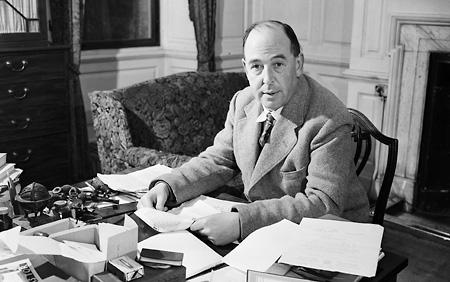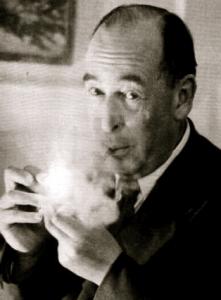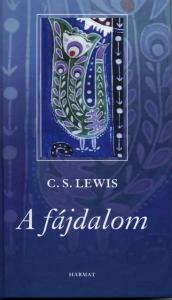The Other Side of a Novelist
Most of you might not recognise the name C. S. Lewis, especially if you see it among philosophers. However, if he's mentioned as the author of The Chronicles of Narnia, most of you will remember through memories of reading books and watching movies, especially as the director of the Narnia films took on another episode of the child fantasy stories. But before you start to feel comfortable in your imaginary theatre seats – I'm not discussing that work now.
Here, I'll be reviewing one of Lewis' works that deals with the psychological and spiritual struggles of human existence. The author has published a number of similar thought-provoking books before. These works deal with essential issues such as love, joy, sorrow, suffering and pain. One basis of his works is that he sees these themes through a christian eye, yet his thoughts and solutions can offer help to anyone regardless of their religion. These aren't scientific works, neither from a theological nor from a philosophical aspect. Lewis doesn't aim at forming a theory on finding the meaning of life. His goal is to recognise, understand the acquired truth and find a way to use it in everyday life. With his simple style and self-irony, Lewis helps his readers see the world from a different point of view. By vivifying and toning the black-and-white religious dogma with his experience, he offers help to his readers for seeking.

In the preface, the author tries to defend his pleading, heartfelt thoughts. Lewis claims that his aim is not to practice but to reach the ideas he writes about. "If I really put down all my thoughts about pain, that shows much spirit. However, this becomes ridiculous as soon as it turns out that I had written it." Reading the book, you mostly encounter rational trains of thought, contexts that originate from the author's life, his existence.
Lewis' starting point is his early disbelief and he creates his work reflecting upon his struggles with faith, his long-ago porblems, clearly sensing the course of his understanding. From chapter to chapter, he takes off from generic and hardly answerable questions. First, he deals with the origins of faith, religion and particularly christianity. He views the world through the eyes of an unbeliever filled with skepticism, and slowly builds his answer. According to his first statement, people never referred to the Creator and his goodness by the flow of life or its atrocity, but original experience of reverence and religious awe towards the enormous, unknown power that is beyond them. This religious declaration is needed to judge pain because, according to Lewis, it is mainly a religious, particularly christian problem. That the world is full of difficult and painful events, is made even more problematic by the fact that we know of a better reality filled with righteousness and love. If you acknowledge the existence of a benign god, how do you explain all the helplessness and suffering in life? Lewis traces his answer back to the nature of love, which is recognised by christianity as the essential characteristic of God. Reading Lewis' reasoning, you can find some valuable thoughts which arrive at their endpoint by touching on subjects including the responsibility of parents, the importance of free will as well as the nature of human and divine love. Early in the book, Lewis aims at getting to know God at some level, through which he supports the "justness" of human pain and suffering. This justification is found in the Bible as follows: "For whom the Lord loveth he chasteneth, and scourgeth every son whom he receiveth." (Hebrews 12:6)

The next unit of thoughts deals with man, often from a divine perspective, as seen from the outside, at times as the faithless denier of the Creator's love, at times as a fellow. Lewis is looking for the reasons, background, origins of our everyday experiences by looking at the deep layers of notions and phenomena to find the different manifestations of pain; physical, psychological, less or more painful. He also takes note of pain through change and its prerequisites. To change, you must first face your improper lifestyle which is something the century-old rhetoric of kindness isn't able to achieve. Thus, by identifying human guilt through rational recognition, one of christianity's goal has to be the restoration of morality, the evaluation of right and wrong. It has to announce the correct diagnose before offering a remedy. On the other side of the unit of thoughts, the author writes about the myth of the christian fallibility and the original, sinless existence of man, building in some ideas previously unknown to me. Since the first man was his own master, he could do things that are unthinkable today; to control his circulation for instance. Because of the absolute unity with God, "the body's processes were controlled by the laws of his own will." Moreover, "you can also suggest that the length of his life was also subject to his decisions." But above all, the first man didn't have any difficulties in worshipping God and obeying his will.

The closing segment of the work deals with the existence beyond life which is mostly made problematic by the existence of hell. "The way things are standing now ... christianity is mostly attacked because of this teachings [regarding hell]. They say it's primitve and God's mercy is in doubt." The question frequently arises: is it right that there is hell? If not what is right then? Lewis explains his last thought in a rational manner, and argues with the essential characteristic of the damned, that is the inability to surrender themselves. There is another passage in this unit dealing with the suffering of animals which – although interesting and includes eye-opening ideas for many readers – I don't think is integral. However, the last chapter continues to discuss the questions of life after death by analysing the teachings on heaven, which appears in fron of our eyes as the final stage, the absolute relief.

It is an original, interesting and thought-provoking journey between dogmatic facts, real experiences and arising questions. I recommend this book to those willing to care for problems such as human free will and helplessness, struggle and resignation, surrender and possession. You can read about the search for human bliss that shows pain and that is filled with divine love.
C. S. Lewis, A fájdalom (The Problem Of Pain), Budapest, Harmat Kiadó, 2008.



Facebook-hozzászólások